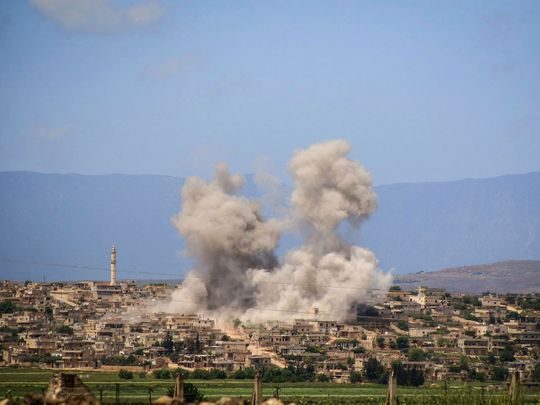
Beirut - A spike in violence in and around a extremist bastion in northwest Syria has killed 948 people in a month, almost a third of them civilians, a war monitor said Friday.
A September deal was supposed to avert a full-out regime offensive on Idlib province and adjacent areas held by Syria’s former Al Qaida affiliate Hayat Tahrir Al Sham.
But the regime and its Russian ally have since late April ramped up deadly air strikes and rocket fire on the extremist stronghold, and fighters have clashed on its edges.
Since April 30, regime and Russian fire has killed 288 civilians including 67 children, the Syrian Observatory for Human Rights said.
Extremist rocket fire has killed a further 22 civilians including 10 children in regime-held territory, the Britain-based monitoring group said.
Bombardment and clashes on the region’s periphery have taken the lives of 369 extremists and allied fighters, as well as 269 fighters on the regime’s side.
The United Nations says roughly 270,000 people have been displaced by the fighting since late April, and aid agencies have been forced to halt work in some areas.
An all-out offensive by Syrian regime forces to capture Idlib from insurgents could unleash an unprecedented humanitarian crisis, for the area is home to 3 million people.
Turkey, which is already hosting more than 3.6 million Syrian refugees, is facing strong pressure from Syria, Iran and Russia to deliver on its pledge to control the armed rebel factions in Idlib.
But Turkey also needs Russia to rein in Syrian President Bashar Assad to prevent a massive outflow of refugees and to keep Turkish soldiers on the ground safe.
Turkish President Recep Tayyip Erdogan and Russian President Vladimir Putin “have an incentive to cooperate and ensure that nobody’s interests are totally trampled,” says Aaron Stein, the director of the Middle East program in American think-tank Foreign Policy Research Institute.
In September, the two leaders brokered a cease-fire for Idlib in the Russian resort of Sochi, preventing a bloody onslaught, despite the fact that Russia has firmly backed Assad and Turkey supports opposition forces. Nine months later, the truce has failed.
The agreement called for a 15-to-20 kilometer (9-to-12 mile) demilitarized zone free of insurgents and heavy weaponry and for two key highways crossing through Idlib to be reopened. The demilitarized zone has been breached and the highways are at the center of the current government offensive.
The conflict has killed more than 400,000 people since it started in 2011.












